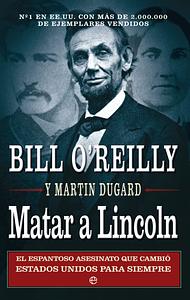You need to sign in or sign up before continuing.
Take a photo of a barcode or cover
(Lincoln dies. How's that for a spoiler?) I liked this book more than I originally anticipated. The first few chapters about the war bore me, but when the actual assassination plot was really when started to enjoy it. A warning to the weak-stomached: At time's, Killing Lincoln is pretty gruesome and I had to close it (i.e. Lincoln's death/atopsy, when Steward was attacked in bed, etc.) My trouble was this: In all the books, the rebel is the good guy. The one you're supposed to cheer and feel for. So with Booth, I always caught myself going, "YAH SHOOT HIM!" and then I'd be like, wait, no, Booth is bad.
Overall, engaging and worth it. 4 Stars.
Overall, engaging and worth it. 4 Stars.
If you like history, you would probably like this. I however, have not been able to keep interested in these types of books.
We listened to this book while traveling and enjoyed it. Since our family was related to the Ford who owned the theater, I thought the descriptions of the theater quite interesting.
Really well written and very interesting. I learned a lot and enjoyed that this reads like a thriller, not a dry historic text. I'm looking forward to reading more of O'Reilly's "Killing..." books.
I didn't pick this book up with the baggage that comes with both Bill O'Reilly, or the Civil War. I find that period of American history to be one of its most interesting. O'Reilly, regardless of what the viewers of Fox or CNN think, is a respectable amateur historian and clearly feels passionate about his country's history.
So it was with some excitement that I began reading his series involving the killing off of various historical characters.
Firstly, O'Reilly sets the scene of a bloody and ugly war, where noble generals like Lee had to trudge in the mud to maintain the principle of the right of States over the federal system. This part of the book is well researched, written without sneering, and very moving. The familiar story of Lee and Grant delaying the surrender was a pleasure to reread.
Now, I understand that this is deliberate, and that the author wants us to feel how angry and hurt Southerners were at the loss of their independence. But at the two-thirds stage of the book we had barely heard from Lincoln or Booth. We knew they were around, and that they were not having a good time. But neither was front and center of the narrative. Had this book been about the Civil War alone, I'd stop here and give it 5 stars.
But this book is about the conspiracy and execution of one of the most famous crimes in history. That we only get to the plot at around two-thirds of the way through is a problem. As interesting as the first stage was, it only serves the purpose of setting the scene and could have been accomplished in half of the time (at most). O'Reilly has been very self-indulgent, wallowing in the romance and nostalgia of an evocative time. I don't blame him for that, and enjoyed so much of it. But it was all sound and fury signifying nothing.
Once we arrive at the plot one feels hurried through it. I don't feel it to be a 'highlights package' or anything of that nature, as everything is well covered with all the necessary detail. But having moved from the slow and expansive introduction, the main story feels rushed. The book is the poorer for it, as the author has not disappointed the reader; he has just made us wonder what might have been if he'd spent more time on this.
The book was enjoyable, but at this stage it has put me off reading the rest of the 'series'.
So it was with some excitement that I began reading his series involving the killing off of various historical characters.
Firstly, O'Reilly sets the scene of a bloody and ugly war, where noble generals like Lee had to trudge in the mud to maintain the principle of the right of States over the federal system. This part of the book is well researched, written without sneering, and very moving. The familiar story of Lee and Grant delaying the surrender was a pleasure to reread.
Now, I understand that this is deliberate, and that the author wants us to feel how angry and hurt Southerners were at the loss of their independence. But at the two-thirds stage of the book we had barely heard from Lincoln or Booth. We knew they were around, and that they were not having a good time. But neither was front and center of the narrative. Had this book been about the Civil War alone, I'd stop here and give it 5 stars.
But this book is about the conspiracy and execution of one of the most famous crimes in history. That we only get to the plot at around two-thirds of the way through is a problem. As interesting as the first stage was, it only serves the purpose of setting the scene and could have been accomplished in half of the time (at most). O'Reilly has been very self-indulgent, wallowing in the romance and nostalgia of an evocative time. I don't blame him for that, and enjoyed so much of it. But it was all sound and fury signifying nothing.
Once we arrive at the plot one feels hurried through it. I don't feel it to be a 'highlights package' or anything of that nature, as everything is well covered with all the necessary detail. But having moved from the slow and expansive introduction, the main story feels rushed. The book is the poorer for it, as the author has not disappointed the reader; he has just made us wonder what might have been if he'd spent more time on this.
The book was enjoyable, but at this stage it has put me off reading the rest of the 'series'.
I thought this book provided an in depth look at President Lincoln's assassination. The authors focused on little details that I was previously unaware of (or knew of only slightly), and expanded them to show how they fit into the events surrounding the assassination. I did, however, think the references to Stanton's potential role seemed forced. That theory has never come up in my other readings and I didn't think the authors presented a very strong case for that theory.
This book chronicles the last two weeks of Lincoln's life, and the chase for his killer. If history class would have presented events like this book does, I would have gotten a lot more out of it. O'Reilly and Dugard have a way of making the past come alive, and I really learned a lot in this book. I'm happy to report that O'Reilly kept his politics out of the story. I knew the basics of the assassination; this book covers the last days of the civil war and details John Wilkes Booth and his plot, which was much more complex than I realized. It also takes you behind the scenes at the White House for a look at how different (and unguarded) Lincoln's presidency was, compared with our president today. He was truly a man of the people, and kept himself accessable to all. I look forward to reading "Killing Kennedy".
I am sorry. But calling this book a "thriller" is just a genuine lie. The reason I gave this book 2 stars is because I learned a few things. While mildly interesting, I was asleep during any part that allowed for O'Reilly's "artistic" interpretation. While trying to make it a thriller, he ended up just dragging out the ending, mistaking it for suspense. Maybe it was because I knew the ending and maybe it was because I felt like it was written for a toddler, by a toddler.
informative
sad
fast-paced

